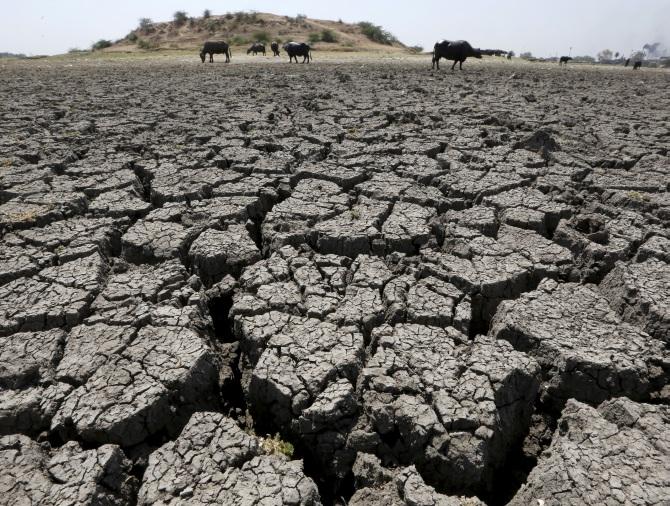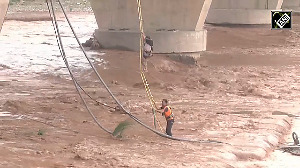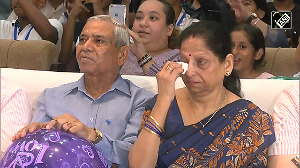
The Centre on Tuesday faced tough questions on its handling of drought-like situation in the country, with the Supreme Court asking whether it was not its responsibility to warn that states that such a scenario was likely to prevail in the near future.
It also chided Gujarat for not filing an affidavit on the matter, saying "just because you're Gujarat doesn't mean you can do whatever you like."
"It is the responsibility of the Centre to inform and warn that these (drought-affected) states will receive less rainfall.
"If you are told that 96 per cent is crop sown in a particular area of the state but you receive information of scanty rainfall, don't just tell them that everything is right and think there is possibility of Centre telling states about a possible drought," a bench headed by Justice M B Lokur said.
The remark by the bench, also comprising Justice N V Ramana came as Additional Solicitor General P A Narasimha, submitted that 256 districts in 10 states were declared as drought-affected.
He clarified that the declaration of a particular area as drought-affected does not mean that it was affecting the entire population of that area as all are not farmers or engaged in agriculture related occupation.
The law officer said the total population in such areas may be 33 crore but "the actual number of people affected by drought is likely to be less than what is reflected in gross population figures of such drought affected districts."
The apex court said the Centre should adopt modern technology to assess drought situation in states instead of following "eye estimation" (cursory survey of farms) method which is not even mentioned in Manual for Drought Management.
The court directed the Centre to apprise it how many households in drought-hit areas got 150 days employment under MNREGA and asked it to submit a compilation of advisories on drought.
It also took Gujarat government to task for submitting note instead of an affidavit on the drought situation and directed it to file it stating details of rainfall data.
"Why have you not filed affidavit? Don't take things so lightly, just because you're Gujarat doesn't mean you can do whatever you like," the bench observed while asking it to submit the document by April 21.
The apex court said the Centre has access to information on rainfall through meteorological department and its satellites in space and the government can make better use of technology by updating states at regular intervals.
"Between June and September if rainfall is less than 75 per cent, the Centre should have told states that be careful. Suppose, Haryana may say we have canals and rivers and we will not face any drought. In November and December, further information is given by satellite about scanty rainfall.
"In January and February you again come to conclusion that crops have failed and you must ask the state to declare drought. For mitigation purposes your activity will start in August," the bench said.
The ASG said the Centre has released more than Rs 19,000 crore under MNREGA so far in current financial year to states to handle drought crisis. He further said that to prevent leakages in the MGNREGA programme, the government has introduced system for electronic transfer of wages directly to the beneficiaries in their bank account in 11 states.
"If you are sending money directly from Delhi to beneficiaries, are you not taking powers of the state," the bench asked.
The ASG replied that states were an integral part of the MGNREGA scheme and verification was done by them after which the amount is disbursed.
The law officer said under the statute, the power to declare drought is the sovereign power of the state and Centre has no role other than issuing advisories. He said the judicial review with respect to declaration of drought is to be contested by the state and it was for this court to decide if any standards should be set up to check whether states have failed in their sovereign duty.
On the issue of restructuring of crop loans to farmers, the ASG told the court that agriculturists in drought-hit areas are entitled to get their loans restructured and reschedule their payment.
"I have clear instructions that banks may restructure loans given to farmers. But frankly speaking, not everybody is willing to restructure their loans. Anybody (farmer) who is not a defaulter in any bank and practices farming in the area declared to be under the spell of drought will be entitled to restructuring of loans," ASG said.
Advocate Prashant Bhushan, appearing for petitioner non-governmental organisdation Swaraj Abhiyan, criticised the Centre for not evolving scientific mechanism for determination of drought and said the government should come out with a standard procedure to deal with such a situation.
"The Centre has figures from all over the country. To decide which state is suffering from drought can be done by the government with the use of technology. They should evolve a standard formula and method for determination of drought," Bhushan said.
The hearing remained inconclusive and would continue on April 21.
The public interest litigation filed by the NGO has alleged that parts of 12 states of Uttar Pradesh, Karnataka, Madhya Pradesh, Andhra Pradesh, Telangana, Maharashtra, Gujarat, Odisha, Jharkhand, Bihar, Haryana and Chattisgarh were hit by drought and the authorities were not providing adequate relief.
IMAGE: Buffalos graze in dried-up Chandola Lake in Ahmedabad. Photograph: Amit Dave/Reuters










